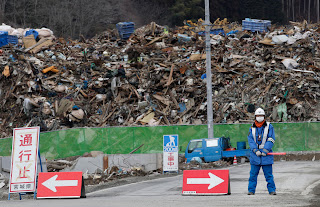Japan, a year later 天災人禍一年後的日本
日本政府以精確及效率著稱
不過核災一年後
還是有災民怨聲載道
看來重建之路還很長
這篇文章從小市民的角度出發
看看災民怎麼說
Japan nuclear evacuees face uncertainty
1 year later
By Ian Munroe, CBC News
福島核災一周年
百姓的生活有好一點嗎?
As Japan prepares to mark the anniversary of last year’s devastating natural and nuclear disaster, many of the evacuees in a city near the ruined Fukushima Daiichi plant wonder how long they will have to continue waiting before they can move on with their lives.
1. To make the …anniversary通常是慶祝周年的意思。天災人禍不能慶祝,就直接說,滿一周年就好了。
2. Evacuee就是當年逃出來的民眾。(被疏散的人)
3. Fukushima Daiichi Plant福島核電廠
4. To move on with one’s life 就是拋開過去的一切,好好開始新生活的意思。
At least a quarter of the 80,000 residents who were displaced by the nuclear meltdowns now live in Iwaki, a sprawling patchwork of communities that lies roughly 40 kilometres south of the ruined nuclear plant. Most of them live in temporary camps scattered across the city that resemble sterile trailer parks, or in private housing rented at premium prices.
1. Nuclear meltdown核災危機
2. Sprawling 通常是指不規則的擴張或是蔓延,這邊就是指災民在災後慢慢朝いわき市Iwaki聚集
3. Temporary camps很像我們台灣災民住的臨時聚落,有組合屋
4. Trailer parks 這邊是說災民住的地方很像美國的拖車公園。美國人有些人喜歡露營,會買拖車trailer用來度假玩樂,這種車子裡面有簡單的廚房浴室跟睡覺的地方,住在裡面還蠻好玩的。美國的各大風景區也有設置一些專門讓人停放拖車的區域,讓人體驗露營的野趣。不過窮一點的美國人,則是真的住在拖車裡面,這就不怎麼好玩了,裡面空間小,而且住久了不方便,災民目前大多住在類似的空間中,生活可想而知。沒錢災民的住在這種臨時的小空間中,有點錢的就租房子住,不過房租非常昂貴。
Search for better housing想找好屋如登天
Like most of the evacuees who are from a rural area of Japan, the Shibatas are elderly, and hop-scotching between less-than-ideal accommodations has hit them particularly hard. Takeo Shibata’s health declined in the months after the evacuation and he began to have more problems getting around.
1. Hop-scotch本來的意思是小朋友玩的跳格子遊戲,這邊則指有些災民得東找西找(跳來跳去)才能找到一間勉強可以落角的地方。Less than ideal當然是不甚滿意,與理想相去甚遠的住家accommodation。
2. Have problems getting around指行動不方便
3. XXX’s Health declined就是某某某健康狀況惡化
Eventually the couple applied and were accepted into a temporary camp in Iwaki that was set up for residents of their abandoned town. They now live alone in part of a trailer furnished with donated appliances and enough room for a small kitchen, a living room where they sleep, and a bathroom.
“It doesn’t feel like home, but it’s a much better place,” Chieko Shibata said.
“The disaster took everybody’s life and hope,” she added. “We are retired and were enjoying the rest of our lives growing plants. Now everything is gone.”
1. 兩個老人家找來找去,費了好大一番心神才申請applied and accepted into 到一處臨時住所。
2. Abandoned town被遺棄了的小鎮(因為受到天災與核災摧殘不得不逃走)
3. 臨時住所用的家電與器具都是他人捐贈的donated appliances如果是電器用品,英文可說electric appliance(s).
Nuclear worries persist輻射憂慮停不了
1. 福島核災後,日本政府雇用很多人去做decontamination 的工作,這是核災後放射線去污的差事,很多去核能電廠工作的人,為了就近工作,就租用當地空出來的旅社房間。這些工作人員大量湧入,讓當地的交通變得壅塞,想要找公寓落腳,也是一屋難求。
1. The problem has left the city divided就是核災事件讓這個城市走向分裂,大家意見分歧,彼此不合。
2. To be unfazed by這個單字之前的瘦肉精已經教過。就是沒被嚇得哇哇叫的意思faze就是很怕,unfazed就是沒在怕。
3. Elevated radiation levels就是輻射量升高的意思
4. 居民對於日本政府事後處理危機的方式handling of the crisis也感到憤怒。To be angry with記得介係詞要用對。
1. 這一段第一句說she falls into the latter camp意思是這個女士的態度是屬於後者。前面不是說過核災之後,人民對於輻射汙染的態度出現兩種聲音,第一種是不怕輻射線的,第二種是擔心且對政府的處理態度感到氣氛的,這位女士的態度屬於後者falls into the latter camp.
2. To take precautions against就是採取預防措施,同樣注意介係詞的正確性。
3. To pose threat to就是威脅到…
1. Radiation detector就是輻射探測器
2. Hot spots這邊指的是高輻射區域或是受到高輻射汙染的物質
3. 當地的松樹pine trees受到輻射汙染的情況最為嚴重
4. To emigrate from是自祖國移民去另外一個新國家。若是要移民至某個國家,英文則要說to immigrate to。以這邊的例子,
Tanaka has decide to emigrate from Japan. 同樣的意思,換成to immigrate to 可說
Tanaka has decided to immigrate to Canada.(記得囉to emigrate from後面要加自己的國家,to immigrate to後面則要加上想要移民去的國家)
“People who don’t care about radiation, they treat you like ‘if you don’t like it, move somewhere else,’” she said. “But if we can’t protect kids, there is no future for Fukushima anymore.”
讓圖片說話
讓圖片說話
圖片來源: Pictures from Reuters KYODO
A year ago/Now
一年前/現在
一年前/現在


















留言
張貼留言